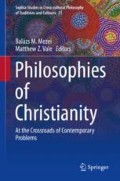Abstract
This volume is a collaborative work in Christian philosophy, and this introductory chapter articulates the view of Christian philosophical engagement which underlies it. On this view, philosophical work brings to light deeper and more adequate understandings of the tenets of Christian belief. To that degree, Christian theology and self-understanding cannot develop adequately without philosophical work which is detached, critical, and free. But if one goal of this volume is to further philosophically developed theologies, its other goal is to encourage theologically developed philosophies. Philosophies otherwise disinterested in religion are routinely motivated by properly theological problems. In that sense, a theological development of philosophy is in some way connatural to the work of philosophy. This volume collects the essays of Christian philosophers and theologians from Europe and the United States who came together for conferences and meetings at Pázmány Péter University in Budapest in 2015. Their contributions both interrogate philosophy theologically, and theology philosophically. They all aim to further the work of a philosophically developed Christianity, and a theologically attentive philosophy. This introduction gives a précis of each chapter, and indicates five main strands of philosophical engagement with Christianity relevant for contemporary conversations.
Access this chapter
Tax calculation will be finalised at checkout
Purchases are for personal use only
Notes
- 1.
Pope John Paul II, Encyclical Letter FIDES ET RATIO of the Supreme Pontiff John Paul II to the Bishops of the Catholic Church on the Relationship between Faith and Reason. Rome: 1998, § 51.
- 2.
Ibid., § 56.
- 3.
See my summary in Balázs M. Mezei, ‘Renewing Christian Philosophy: An Outline’, in Christian Wisdom Meets Modernity, ed. Kenneth Oakes, Illuminating Modernity Series (New York; London: Bloomsbury Publishing, 2016), pp. 203–2033. Cf. also Mezei, ‘Catholic Philosophy in the New Millennium’, in Mezei, Religion and Revelation after Auschwitz (New York: Bloomsbury, 2013), pp. 297–317. For an overall criticism of the presuppositions of Christian thinking, cf. Mezei, ‘Demythologizing Christian Philosophy: An Outline’, Logos i ethos 1, no. 34 (2013): pp. 109–146. As for the criticism of the presuppositions of traditional Christian philosophy, see Mezei, ‘Realist Phenomenology and Philosophy of Religion: A Critical Reflection’, Logos i ethos 44, no. 1 (2017): pp. 47–70.
- 4.
Étienne Gilson, The Unity of Philosophical Experience (New York: Charles Scribner’s Sons, 1950), p. 301.
- 5.
I have attempted a comparative approach in my ‘Catholic Philosophy in the New Millennium’, cited above.
- 6.
Cf. Stephen M. Barr, Modern Physics and Ancient Faith (Notre Dame: University of Notre Dame Press, 2003).
- 7.
Cf. Rafael Luciani, Pope Francis and the Theology of the People (New York: Orbis Books), 2017.
Bibliography
Barr, Stephen M. 2003. Modern Physics and Ancient Faith. Notre Dame: University of Notre Dame Press.
Gilson, Étienne. 1950. The Unity of Philosophical Experience. New York: Charles Scribner’s Sons.
John Paul II. 1998. Encyclical Letter FIDES ET RATIO of the Supreme Pontiff John Paul II to the Bishops of the Catholic Church on the Relationship between Faith and Reason. Rome. http://w2.vatican.va/content/john-paul-ii/en/encyclicals/documents/hf_jp-ii_enc_14091998_fides-et-ratio.html. Accessed 19 July 2017.
László, Ervin. 2016. What Is Reality? The New Map of Cosmos and Consciousness. New York: Select Books.
Luciani, Rafael. 2017. Pope Francis and the Theology of the People. New York: Orbis Books.
Mezei, Balázs M. 2013a. Catholic Philosophy in the New Millennium. In Religion and Revelation After Auschwitz, ed. Balázs M. Mezei, 297–317. New York: Bloomsbury.
———. 2013b. Demythologizing Christian Philosophy: An Outline. Logos i ethos 1 (34): 109–146.
———. 2017. Realist Phenomenology and Philosophy of Religion: A Critical Reflection. Logos i ethos 44 (1): 47–70.
———. 2016. Renewing Christian Philosophy: An Outline. In Christian Wisdom Meets Modernity, Illuminating Modernity Series, ed. Kenneth Oakes, 203–233. New York/London: Bloomsbury Publishing.
Author information
Authors and Affiliations
Corresponding author
Editor information
Editors and Affiliations
Rights and permissions
Copyright information
© 2019 Springer Nature Switzerland AG
About this chapter
Cite this chapter
Mezei, B.M. (2019). Introduction. In: Mezei, B., Vale, M. (eds) Philosophies of Christianity. Sophia Studies in Cross-cultural Philosophy of Traditions and Cultures, vol 31. Springer, Cham. https://doi.org/10.1007/978-3-030-22632-9_1
Download citation
DOI: https://doi.org/10.1007/978-3-030-22632-9_1
Published:
Publisher Name: Springer, Cham
Print ISBN: 978-3-030-22631-2
Online ISBN: 978-3-030-22632-9
eBook Packages: Religion and PhilosophyPhilosophy and Religion (R0)

